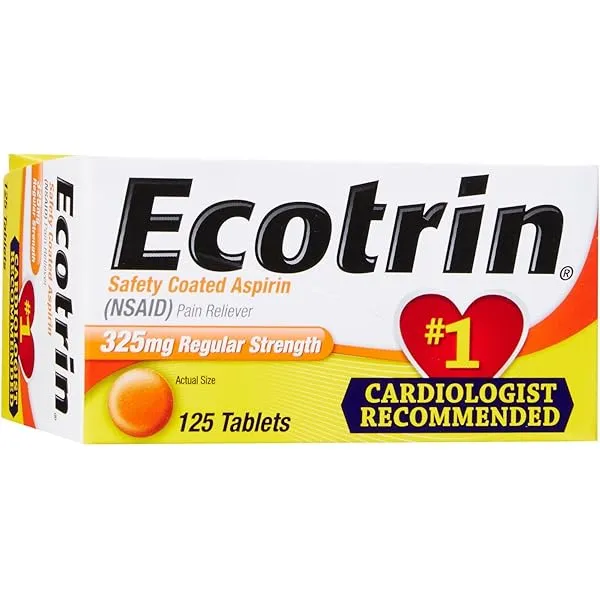Comprehensive Guide to Aspirin: Uses, Dosage, Side Effects, and More
What is Aspirin?
Overview of Aspirin
Generic Name: Acetylsalicylic Acid (Aspirin)
Brand Name: Bayer, Ecotrin, Bufferin, Anacin, generics
Drug Group: Nonsteroidal anti-inflammatory drug (NSAID); analgesic; antipyretic; antiplatelet
Commonly Used For
- Relieve mild to moderate pain (e.g., headaches, muscle aches, arthritis).
- Reduce fever in adults.
- Prevent cardiovascular events (e.g., heart attack, stroke) in high-risk patients.
- Manage acute coronary syndrome or ischemic stroke (under medical supervision).
- Off-label uses include Kawasaki disease or preeclampsia prevention under specialist guidance.
Key Characteristics
Form: Oral tablets (81 mg, 325 mg, 500 mg); enteric-coated tablets (81 mg, 325 mg); chewable tablets (81 mg); suppositories (rare, 300 mg).
Mechanism: Inhibits COX-1 and COX-2, reducing prostaglandin synthesis (for pain/inflammation) and thromboxane A2 (for antiplatelet effects).
Approval: FDA-approved (over-the-counter since 1939) and EMA-approved for pain, fever, and cardiovascular indications.

Indications and Uses of Aspirin
Aspirin is indicated for
Pain Relief: Treats mild to moderate pain from headaches, menstrual cramps, toothaches, or osteoarthritis.
Fever Reduction: Lowers fever in adults caused by infections or other conditions.
Cardiovascular Prevention: Reduces risk of heart attack or stroke in patients with prior events or high risk (e.g., coronary artery disease).
Acute Coronary Syndrome: Used in myocardial infarction or unstable angina (under medical supervision).
Ischemic Stroke: Administered acutely or for secondary prevention (with medical guidance).
Off-Label Uses: Treats Kawasaki disease, prevents preeclampsia in high-risk pregnancies, or manages pericarditis under specialist supervision.
Note: The drug is not recommended for fever or pain in children under 16 due to the risk of Reye’s syndrome, except in specific cases like Kawasaki disease.
Dosage of Aspirin
Dosage for Adults
Pain or Fever: 325–650 mg every 4–6 hours as needed (maximum 4,000 mg/day).
Cardiovascular Prevention: Low-dose: 81–162 mg daily (enteric-coated preferred to reduce GI irritation).
Acute Coronary Syndrome: Initial: 162–325 mg (chewable, non-enteric-coated) at onset, followed by 81–162 mg daily.
Ischemic Stroke: Initial: 160–325 mg within 48 hours, followed by 81–325 mg daily for secondary prevention.
Dosage for Children
Kawasaki Disease (Under Specialist Supervision):
- Acute phase: 80–100 mg/kg/day in 4 divided doses for 14 days or until fever resolves.
- Maintenance: 3–5 mg/kg/day (low-dose) for 6–8 weeks.
Pain/Fever: Generally avoided in children <16 years due to Reye’s syndrome risk.
Dosage for Pregnant Women
Dosage Adjustments
Renal Impairment: Use cautiously; avoid high doses in severe cases to prevent toxicity.
Hepatic Impairment: Avoid in severe liver disease; monitor for bleeding risk.
Elderly: Use lowest effective dose; increased risk of GI bleeding.
Additional Considerations
- Take with food or milk to reduce stomach upset; enteric-coated forms minimize GI irritation.
- Do not crush enteric-coated tablets; use chewable forms for acute cardiac events.
How to Use Aspirin
Administration:
- Tablets/Capsules: Swallow with water; take with food to reduce GI upset.
- Chewable Tablets: Chew thoroughly for rapid absorption (e.g., in acute coronary syndrome).
- Enteric-Coated: Swallow whole; do not crush or chew to maintain coating.
Timing: Take pain/fever doses every 4–6 hours as needed; take low-dose daily at the same time for cardiovascular prevention.
Missed Dose: Take as soon as remembered for pain/fever; for daily low-dose, skip if near next dose. Consult your doctor if unsure.
Additional Tips:
- Avoid alcohol to reduce GI bleeding risk.
- Report signs of bleeding (e.g., black stools, unusual bruising) immediately.
Contraindications for Aspirin
The pain reliever is contraindicated in:
Patients with hypersensitivity to Aspirin, other NSAIDs, or salicylates.
Those with active peptic ulcer disease or recent gastrointestinal bleeding.
Patients with bleeding disorders (e.g., hemophilia, von Willebrand disease).
Children <16 years with viral infections (due to Reye’s syndrome risk).
Patients with severe renal or hepatic impairment.
Warnings & Precautions for Aspirin
General Warnings
Gastrointestinal Bleeding: Risk of stomach ulcers or bleeding, especially with high doses or alcohol use; monitor for black stools or abdominal pain.
Reye’s Syndrome: Rare but serious in children <16 years with viral infections; avoid in this group unless specifically indicated.
Allergic Reactions: Risk of anaphylaxis or bronchospasm, especially in aspirin-sensitive asthma; discontinue if rash or breathing difficulties occur.
Bleeding Risk: Antiplatelet effects increase bleeding risk; use cautiously before surgery or dental procedures.
Tinnitus: High doses may cause ringing in ears; reduce dose or discontinue.
Use in Specific Populations
Pregnancy: Low-dose (Category C) safe for specific indications; high-dose (Category D) avoided in third trimester. Consult an obstetrician.
Breastfeeding: Excreted in breast milk; avoid high doses, monitor infant for bleeding or rash.
Elderly: Increased risk of GI bleeding and renal effects; use lowest effective dose.
Children: Avoid for pain/fever in those <16 years; use only for specific indications (e.g., Kawasaki disease).
Renal/Hepatic Impairment: Use cautiously; avoid in severe cases.
Additional Precautions
- Inform your doctor about bleeding disorders, asthma, or stomach ulcers before starting the medication.
- Stop Aspirin 5–7 days before planned surgeries unless advised otherwise.
Overdose and Management of Aspirin
Overdose Symptoms
Overdose may cause:
- Tinnitus, dizziness, or confusion.
- Nausea, vomiting, or abdominal pain.
- Severe: Metabolic acidosis, respiratory alkalosis, seizures, or coma.
Immediate Actions
Contact Emergency Services: Call 911 or seek medical help immediately.
Supportive Care: Administer activated charcoal (if early); correct acid-base imbalances; hemodialysis in severe cases.
Monitor: Check salicylate levels, electrolytes, and respiratory status.
Additional Notes
- Overdose is a medical emergency; even moderate excess can be dangerous.
- Store securely to prevent accidental ingestion, especially by children.
Side Effects of Aspirin
Common Side Effects
- Stomach upset (5–10%)
- Heartburn (3–5%)
- Nausea (2–4%)
- Rash (1–2%)
These effects are often mild and reduced with food or enteric-coated forms.
Serious Side Effects
Seek immediate medical attention for:
Gastrointestinal: Black stools, vomiting blood, or severe abdominal pain.
Allergic Reactions: Rash, hives, or difficulty breathing (anaphylaxis).
Bleeding: Unusual bruising, nosebleeds, or prolonged bleeding.
Neurologic: Tinnitus, confusion, or seizures (overdose signs).
Additional Notes
- Regular monitoring for bleeding or GI symptoms is critical, especially with long-term use.
- Report persistent or severe side effects promptly.
Drug Interactions with Aspirin
The medication may interact with:
Anticoagulants (e.g., Warfarin, Heparin): Increase bleeding risk; monitor INR closely.
Other NSAIDs (e.g., Ibuprofen): Increase GI bleeding risk; ibuprofen may reduce Aspirin’s antiplatelet effect if taken concurrently.
Corticosteroids: Increase GI ulcer risk; use cautiously.
Methotrexate: Increases methotrexate toxicity; monitor levels and adjust doses.
ACE Inhibitors: May reduce antihypertensive effect; monitor blood pressure.
Patient Education or Lifestyle
Medication Adherence: Take Aspirin as prescribed, especially for cardiovascular prevention; do not exceed maximum doses for pain/fever. Refill prescriptions early.
Monitoring: Watch for signs of bleeding (e.g., black stools, easy bruising); report immediately.
Lifestyle: Follow a heart-healthy diet (low sodium, low saturated fat), exercise regularly, and avoid smoking for cardiovascular benefits.
Diet: Take with food to reduce GI irritation; avoid alcohol to minimize bleeding risk.
Emergency Awareness: Carry information about your condition (e.g., cardiovascular risk) and medications; know signs of bleeding or overdose.
Children’s Safety: Avoid use in children <16 years for viral infections; educate household members about Reye’s syndrome.
Pharmacokinetics of Aspirin
Absorption: Rapidly absorbed orally; peak plasma concentration at 1–2 hours; enteric-coated forms delay absorption.
Distribution: Wide distribution; volume of distribution ~0.15 L/kg; highly protein-bound (80–90%).
Metabolism: Hepatic, hydrolyzed to salicylic acid (active metabolite); further metabolized via glucuronidation and glycine conjugation.
Excretion: Renal (80–100% as metabolites); dose-dependent half-life (low-dose: 2–3 hours; high-dose: 15–30 hours).
Half-Life: Aspirin (15–20 minutes); salicylic acid (2–3 hours at low doses).
Pharmacodynamics of Aspirin
The drug exerts its effects by:
Irreversibly inhibiting COX-1 and COX-2, reducing prostaglandin and thromboxane A2 synthesis.
Providing analgesia and antipyresis via central and peripheral prostaglandin reduction.
Preventing platelet aggregation for 7–10 days (platelet lifespan) at low doses.
Exhibiting dose-dependent effects: low doses for antiplatelet, higher doses for pain/inflammation.
Storage of Aspirin
Temperature: Store at room temperature (20–25°C or 68–77°F); avoid moisture and heat.
Protection: Keep in original container to protect from moisture; ensure child-resistant packaging.
Safety: Store out of reach of children to prevent accidental ingestion.
Disposal: Follow local regulations or consult a pharmacist for safe disposal of unused or expired medication.
Frequently Asked Questions (FAQs) About Aspirin
Q: What does Aspirin treat?
A: The drug treats pain, fever, and prevents heart attacks or strokes in high-risk patients.
Q: Can Aspirin cause stomach bleeding?
A: Yes, especially at high doses or with alcohol; take with food and report black stools.
Q: Is Aspirin safe for children?
A: Avoid in children <16 years for pain/fever due to Reye’s syndrome risk.
Q: Can I take Aspirin daily for heart health?
A: Low-dose (81 mg) may be prescribed for cardiovascular prevention; consult your doctor.
Q: How long does Aspirin take to work?
A: Pain relief within 30–60 minutes; antiplatelet effects within hours.
Regulatory Information for Aspirin
The medication is approved by:
U.S. Food and Drug Administration (FDA): Approved as an OTC drug since 1939; prescription for specific indications (e.g., Kawasaki disease).
European Medicines Agency (EMA): Approved as acetylsalicylic acid for similar indications.
Other Agencies: Approved globally for equivalent uses; consult local guidelines.
References
- U.S. Food and Drug Administration (FDA). (2023). Aspirin Drug Information.
- Official FDA resource detailing the drug’s uses, safety, and warnings.
- European Medicines Agency (EMA). (2023). Acetylsalicylic Acid Summary of Product Characteristics.
- EMA’s comprehensive information on the medication’s indications and precautions in Europe.
- National Institutes of Health (NIH). (2023). Aspirin: MedlinePlus Drug Information.
- NIH resource providing detailed information on the drug’s uses, side effects, and precautions.
- World Health Organization (WHO). (2023). WHO Model List of Essential Medicines: Acetylsalicylic Acid.
- WHO’s inclusion of Aspirin as an essential medicine for pain and cardiovascular prevention.
- The Lancet. (2021). Aspirin in Cardiovascular Disease Prevention.
- Peer-reviewed article on Aspirin efficacy (note: access may require a subscription).
